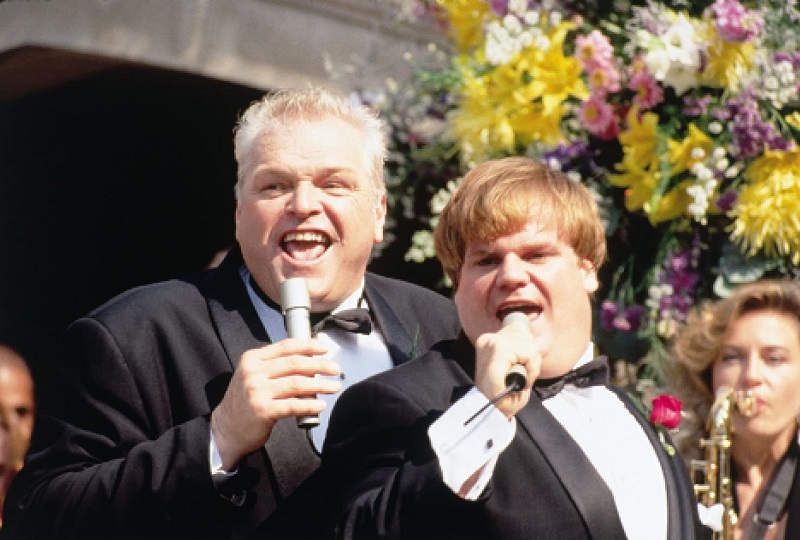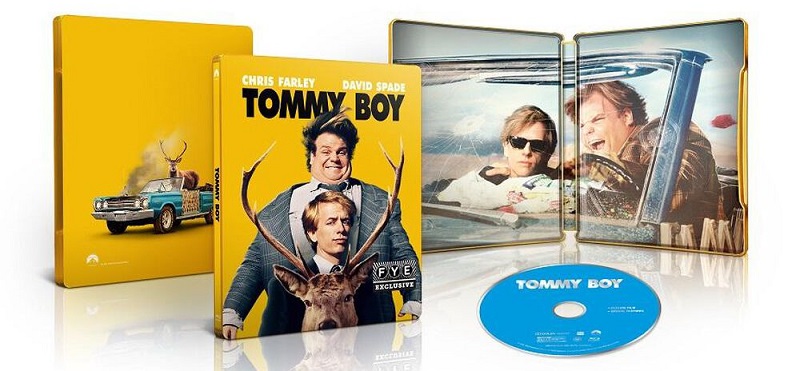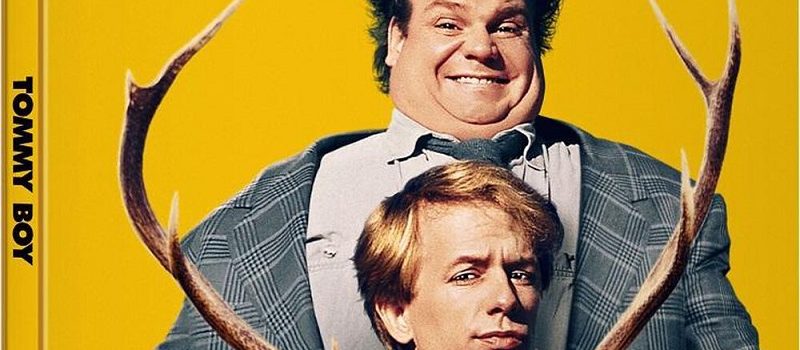The late, and supremely great, Chris Farley could have a no better home video release to tribute his unique gifts than the 25th anniversary, exclusive to retailer FYE, Steelbook Blu-Ray release of Tommy Boy. Joining him is frequent comedic partner extraordinaire, David Spade, in the comedic tale of an act of nepotism in the car brake business that finds Farley’s Tommy Callahan having to hit the road to save the family business.

What made their first film so special was its heaps of heart. Yes, the buffoonery is off the charts and that is what solicits a majority of the laughs, particularly emanating from Tommy. The movie chronicles the titular character who inherits his father’s unbeknownst to him, failing auto parts factory when he father (Brian Dennehy) passes away suddenly. His father’s assistant Richard (Spade) is tasked with joining Tommy on the road to win back some of those clients who have gone in other directions. Slowly, but surely, as Richard and Tommy hit the road to save the Callahan family business, don’t be surprised if one notices a warming of the heart region that mirrors the thawing response of customers on the screen.
The big selling point here is Spade and Farley. There are only a handful of comic duos that possess the cinematic comedic chemistry that these two had. It’s a list that includes Dean Martin and Jerry Lewis, Laurel and Hardy, Jack Lemmon and Walter Matthau, and Will Ferrell and John C. Reilly. Even though they only produced a handful of flicks, these two SNL veterans belong firmly on that list and proof of that is all over Tommy Boy. Every comedy duo has to have the wild one and the straight guy. The thing about Spade and Farley, with their first flick, is that each sublimely can play each role as the scene requires. Sure, most of the straight guy trope was firmly on Spade’s call sheet, but Farley could switch up the tables as needed.
This is fish out of water on steroids. But what makes this Tommy tale different is that this fish learns to breathe where others have suffocated. As he learns the Callahan family business and more importantly, discovers his voice as a company leader, that is where director Peter Segal (Grudge Match, Naked Gun 33 1/3) lets his storytelling command shine. It takes a director of Segal’s sensitivity to creatively take what could have been solely a boorish tale and inject an emotive warm spell that has it still resonating two and a half decades later. Segal is an actor’s director if there ever was one and whether it’s old pros (such as Sylvester Stallone and Robert De Niro in Grudge Match) or cinema newbies like Spade and Farley, the helmer commanded all sorts of respect from his thespians and he got the most out of every single one of them.
Segal is also quite adept at bringing the ensemble that supports his leads into the fold and giving each at least one moment to shine. This is all while they keenly are aware of their role as a spoke in this comedic wheel. Tommy Boy saw stellar turns from Dennehy, Rob Lowe, Dan Aykroyd and Doc Hollywood breakout star Julie Warner.
Dennehy played Tommy’s pop and had the challenge of giving a larger-than-life performance as the leader of the company and as the titular character’s father so that when he meets his demise, early in the film, his shadow, influence and paternal power would shine through the remainder of the story. Dennehy is that actor and just nails it. Meanwhile, Lowe had a nice run there where he excelled at playing dashingly handsome, yet slimy ethically, characters (see Wayne’s World). He was asked to play that part in Tommy Boy and he too, hit it out of the park. It may seem at the outset that Derek wasn’t asked to stretch too much for her part. The thing is her Beverly may seem to solely be the gorgeous, much younger trophy wife of Tommy’s dad. Her skills go much deeper and as such Derek too, hits a home run. Aykroyd as Zalinsky is pure gold and Warner showed so much heart as a potential love interest that never felt unbelievable—where it could have easily done just that.
It’s hard to believe that it has been 25 years to the day that the original film landed in theaters. How on earth has that much time passed through the hourglass? With the FYE release of the Steelbook Blu-Ray, comes a slew of previously released bonus features. Now, if you do not have this flick in your collection, rush over to FYE and add this puppy to the home video library and dive into those bonus features that are both wildly entertaining as they are enlightening on many fronts.

There are four featurettes that delve into the making of Tommy Boy. They clock in at just about an hour and as such, devote just about the right amount of time to answer all the questions that may have arisen concerning the making-of one of modern Hollywood’s new classic comedies.
Each one of the featurettes can be witnessed by themselves or let ‘er rip as one long extra. Behind the Laughter centers on Farley and Spade’s camaraderie that takes viewers back to SNL and follows their righteous and riotous collective sense of humor and it’s easy to see why the pair clicked after witnessing that featurette. Stories from the Side of the Road is a crew-centric extra that features some great stories about the logistics of making Tommy Boy. Just the Two of Us spotlights the cast and crew waxing poetic about the brilliance of Spade and Farley and if one gets a little misty eyed at what the world has missed from the late star, you’re not alone. Lastly, there is Growing up Farley. That featurette has the brothers of Farley, John and Kevin—both of whom appear in Tommy Boy—sharing invaluable insight into their brother and what on earth it was like to grow up with Chris as one’s brother, as well as giving us a familial front row to his skyrocketing success.
Segal does a great job with the deleted, extended and alternative takes that are included in the bonus features. Normally, these can be a bit stale. But given that we don’t have the gift of Farley anymore, insight into his comedic process is all front and center on all these scenes shown in various forms of where they landed in Tommy Boy—on the final cut or on the floor. He makes a few wildly riveting statements with a few of the deleted scenes and after showing them to us, his thoughts that some “should have stayed in the film” is spot-on, insightful and not an insight we’ve ever so honestly laid out there by a filmmaker—basically admitting he made a mistake. Of course, we love Tommy Boy exactly the way we got it. It’s just that level of self-awareness meets lack of ego is downright refreshing.

Now, those 15 extended scenes (that clocks in at about 22 minutes) often were simply just one line that was cut and it’s great to get that kind of access to the filmmaking process and draw our own collective conclusion as to whether Segal did the right thing with his editing team.
For those who turn to bonus features as kind of a film school-type of experience, dive into the featurette 7 Storyboard Comparisons. This is exactly as it sounds and for someone who has always been utterly fascinated by the use of storyboards in the filmmaking creative toolbox, this is a fantastically fine featurette.
Don’t miss the gag reel (which sadly is only four minutes) and then for pure nostalgia, take your time and work your way through the Photo Gallery. It finds 50 behind-the-scenes images (some in color, others in black and white) that truly brings the crux of what has been stated throughout the bonus features and experienced with the film itself, all home.
Lastly, if you’re into director commentaries, prepare to bask in the brilliance of Segal as he delivers insight that could not be more wide-ranging. The helmer speaks to how addictions plagued Farley. Segal makes the point that it didn’t affect his production, but it obviously cut his earthly presence way too short.
Film Grade: B+
Bonus Features: B

